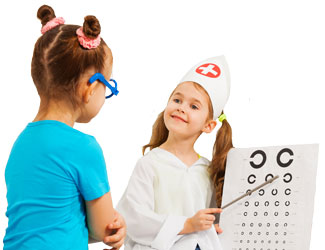Why Your Child Should See a Pediatric Eye Doctor
Children may experience some of the same eye problems found in adults; however, their care is often quite different. They may be too young to explain their symptoms or to sit patiently for exams. They benefit from being seen by eye doctors who are experienced in evaluating and caring for infants and children and who use advanced diagnostic, medical, and surgical techniques.
Many childhood eye conditions can be treated without surgery, and often interventions are as simple as wearing eyeglasses or using an eye patch, new computer-based amblyopia treatments, or using eyedrops. However, if childhood glaucoma, cataracts, retinoblastoma, or another serious pediatric eye disease is detected and medical intervention or surgery is needed, your child will receive care at Duke from respected leaders in pediatric ophthalmology. Our eye care professionals train doctors to become pediatric eye care providers and eye surgeons. They lecture worldwide on the latest advances in pediatric eye care and engage in research to develop new and better treatments that are followed around the world.
Access to a Wide Range of Pediatric Eye Specialists
The following eye specialists may be part of your child's team.
Ophthalmologists
These specialists are fellowship-trained in pediatric ophthalmology and strabismus, and the medical and surgical management of childhood eye conditions including amblyopia and strabismus; blocked tear ducts and childhood eyelid problems; glaucoma; cataracts; and prematurity-related eye problems; among other rare conditions. They perform surgery and manage complex eye muscle problems.
Pediatric Optometrists
These optometrists have completed additional training in pediatric eye care. They perform regular eye exams using the latest diagnostic equipment to assess your child’s vision and eye health; screen for myopia and astigmatism; identify serious childhood eye problems if they are present; and prescribe eyeglasses as needed. They also apply the latest techniques to help families manage progressive myopia in children, and use medication and special contact lenses as appropriate.
Orthoptists
An orthoptist is a healthcare professional who specializes in the diagnosis and treatment of disorders related to eye movements, binocular vision, and visual function.
Pediatric Neuro-ophthalmologists
These are experts in pediatric eye conditions that relate to or result from neurologic problems.
Cornea Specialists
These specialists have expertise in managing vision-threatening corneal conditions in children.
Inherited Retinal Disease and Vitreoretinal Specialists
These experts treat children with complex retinal and optic nerve diseases that affect vision.
Oculoplastic Surgeons
They perform surgery on the face, eyes, tear system, and facial structures surrounding the eye to improve your child’s appearance following cancer, trauma, or congenital defects or to resolve a less serious issue such as a blocked tear duct system.
Specialized Services for Pediatric Eye Diseases
Child-Friendly Center
Children are often anxious or impatient while waiting to see the doctor. Our child-friendly waiting room and clinical spaces have flat-screen televisions (with child-appropriate content) and space to move around. The environment is designed to reduce stress for the whole family.
Routine Eye Exams
Our pediatric optometrists specialize in assessing vision development and correcting vision problems in children. We check the health of your child’s eyes, screen for a full range of eye conditions, measure how well they see, and determine if they need glasses or contact lenses.
Specialty Contact Lenses
Pediatric specialty contact lenses can help improve vision, promote visual development, and improve the quality of life for children with certain eye conditions.
Our pediatric optometrists have advanced training in determining the best type of specialty contact lens for your child. They will undergo a specialty contact lens fitting, and our technicians will teach your child – and you -- how to insert, remove, and care for the lenses.
Coordinated Care for Maximum Convenience
Our pediatric ophthalmologists, optometrists, and orthoptists (specialists in vision and eye movement problems) work closely with other Duke pediatric specialists to manage your child’s eye care. If your child requires multiple visits for different eye disorders, we make every effort to coordinate their care and maximize your convenience.
Supportive Environment
We offer patient support services, including educational materials and programs and a vision rehabilitation program. Our social worker can help your family cope with and manage non-medical challenges related to your child’s condition.

